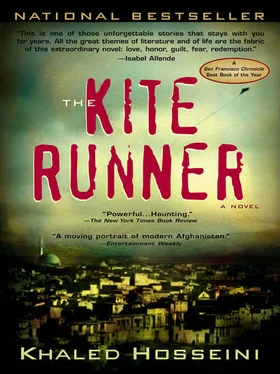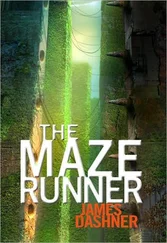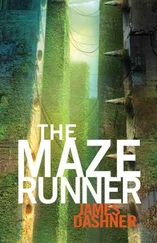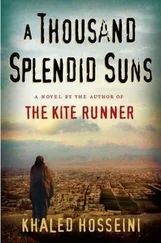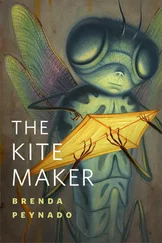I ran the stand sometimes as Baba sauntered down the aisle, hands respectfully pressed to his chest, greeting people he knew from Kabul: mechanics and tailors selling hand-me-down wool coats and scraped bicycle helmets, alongside former ambassadors, out-of-work surgeons, and university professors.
One early Sunday morning in July 1984, while Baba set up, I bought two cups of coffee from the concession stand and returned to find Baba talking to an older, distinguished-looking man. I put the cups on the rear bumper of the bus, next to the REAGAN/BUSH FOR ’84 sticker.
“Amir,” Baba said, motioning me over, “this is General Sahib, Mr. Iqbal Taheri. He was a decorated general in Kabul. He worked for the Ministry of Defense.”
Taheri. Why did the name sound familiar?
The general laughed like a man used to attending formal parties where he’d laughed on cue at the minor jokes of important people. He had wispy silver-gray hair combed back from his smooth, tanned forehead, and tufts of white in his bushy eyebrows. He smelled like cologne and wore an iron-gray three-piece suit, shiny from too many pressings; the gold chain of a pocket watch dangled from his vest.
“Such a lofty introduction,” he said, his voice deep and cultured. “ Salaam, bachem .” Hello, my child.
“ Salaam , General Sahib,” I said, shaking his hand. His thin hands belied a firm grip, as if steel hid beneath the moisturized skin.
“Amir is going to be a great writer,” Baba said. I did a double take at this. “He has finished his first year of college and earned A’s in all of his courses.”
“Junior college,” I corrected him.
“Mashallah,” General Taheri said. “Will you be writing about our country, history perhaps? Economics?”
“I write fiction,” I said, thinking of the dozen or so short stories I had written in the leather-bound notebook Rahim Khan had given me, wondering why I was suddenly embarrassed by them in this man’s presence.
“Ah, a storyteller,” the general said. “Well, people need stories to divert them at difficult times like this.” He put his hand on Baba’s shoulder and turned to me. “Speaking of stories, your father and I hunted pheasant together one summer day in Jalalabad,” he said. “It was a marvelous time. If I recall correctly, your father’s eye proved as keen in the hunt as it had in business.”
Baba kicked a wooden tennis racket on our tarpaulin spread with the toe of his boot. “Some business.”
General Taheri managed a simultaneously sad and polite smile, heaved a sigh, and gently patted Baba’s shoulder. “ Zendagi migzara ,” he said. Life goes on. He turned his eyes to me. “We Afghans are prone to a considerable degree of exaggeration, bachem , and I have heard many men foolishly labeled great. But your father has the distinction of belonging to the minority who truly deserves the label.” This little speech sounded to me the way his suit looked: often used and unnaturally shiny.
“You’re flattering me,” Baba said.
“I am not,” the general said, tilting his head sideways and pressing his hand to his chest to convey humility. “Boys and girls must know the legacy of their fathers.” He turned to me. “Do you appreciate your father, bachem ? Do you really appreciate him?”
“Balay, General Sahib, I do,” I said, wishing he’d not call me “my child.”
“Then congratulations, you are already halfway to being a man,” he said with no trace of humor, no irony, the compliment of the casually arrogant.
“Padar jan, you forgot your tea.” A young woman’s voice. She was standing behind us, a slim-hipped beauty with velvety coal black hair, an open thermos and Styrofoam cup in her hand. I blinked, my heart quickening. She had thick black eyebrows that touched in the middle like the arched wings of a flying bird, and the gracefully hooked nose of a princess from old Persia – maybe that of Tahmineh, Rostam’s wife and Sohrab’s mother from the Shahnamah . Her eyes, walnut brown and shaded by fanned lashes, met mine. Held for a moment. Flew away.
“You are so kind, my dear,” General Taheri said. He took the cup from her. Before she turned to go, I saw she had a brown, sickle-shaped birthmark on the smooth skin just above her left jawline. She walked to a dull gray van two aisles away and put the thermos inside. Her hair spilled to one side when she kneeled amid boxes of old records and paperbacks.
“My daughter, Soraya jan,” General Taheri said. He took a deep breath like a man eager to change the subject and checked his gold pocket watch. “Well, time to go and set up.” He and Baba kissed on the cheek and he shook my hand with both of his. “Best of luck with the writing,” he said, looking me in the eye. His pale blue eyes revealed nothing of the thoughts behind them.
For the rest of that day, I fought the urge to look toward the gray van.
IT CAME TO ME on our way home. Taheri. I knew I’d heard that name before.
“Wasn’t there some story floating around about Taheri’s daughter?” I said to Baba, trying to sound casual.
“You know me,” Baba said, inching the bus along the queue exiting the flea market. “Talk turns to gossip and I walk away.”
“But there was, wasn’t there?” I said.
“Why do you ask?” He was looking at me coyly.
I shrugged and fought back a smile. “Just curious, Baba.”
“Really? Is that all?” he said, his eyes playful, lingering on mine. “Has she made an impression on you?”
I rolled my eyes. “Please, Baba.”
He smiled, and swung the bus out of the flea market. We headed for Highway 680. We drove in silence for a while. “All I’ve heard is that there was a man once and things… didn’t go well.” He said this gravely, like he’d disclosed to me that she had breast cancer.
“Oh.”
“I hear she is a decent girl, hardworking and kind. But no khastegar s, no suitors, have knocked on the general’s door since.” Baba sighed. “It may be unfair, but what happens in a few days, sometimes even a single day, can change the course of a whole lifetime, Amir,” he said.
LYING AWAKE IN BED that night, I thought of Soraya Taheri’s sickle-shaped birthmark, her gently hooked nose, and the way her luminous eyes had fleetingly held mine. My heart stuttered at the thought of her. Soraya Taheri. My Swap Meet Princess.
In Afghanistan, yelda is the first night of the month of Jadi , the first night of winter, and the longest night of the year. As was the tradition, Hassan and I used to stay up late, our feet tucked under the kursi , while Ali tossed apple skin into the stove and told us ancient tales of sultans and thieves to pass that longest of nights. It was from Ali that I learned the lore of yelda , that bedeviled moths flung themselves at candle flames, and wolves climbed mountains looking for the sun. Ali swore that if you ate watermelon the night of yelda , you wouldn’t get thirsty the coming summer.
When I was older, I read in my poetry books that yelda was the starless night tormented lovers kept vigil, enduring the endless dark, waiting for the sun to rise and bring with it their loved one. After I met Soraya Taheri, every night of the week became a yelda for me. And when Sunday mornings came, I rose from bed, Soraya Taheri’s brown-eyed face already in my head. In Baba’s bus, I counted the miles until I’d see her sitting barefoot, arranging cardboard boxes of yellowed encyclopedias, her heels white against the asphalt, silver bracelets jingling around her slender wrists. I’d think of the shadow her hair cast on the ground when it slid off her back and hung down like a velvet curtain. Soraya. Swap Meet Princess. The morning sun to my yelda .
Читать дальше
